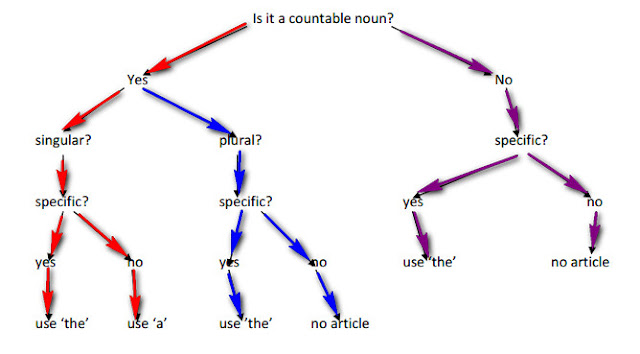Basic Sentence Elements
Basic Sentence Elements
The ability to identify the sentence elements and the understanding of their arrangement and their relationship are the first to learning writing skills.
Note: The six basic requirements of a
written sentence are:
-A capital
letter at the beginning.
-Punctuation
at the end (a full stop, a question mark, or an exclamatory point).
-A subject.
-A
predicate containing a complete verb phrase.
-Standard
word order (commonly, S+V (complement).
-An
independent clause; that is a complete idea that can stand alone with its own
subject and verb.
1.
Identifying the subject:
The subject
is the person or things talked about. It may be expressed by a noun, a pronoun,
or a group of words doing the work of noun.
The sun shines (subject -noun)
They are playing (subject-pronoun)
The new
settled and their two children visited the region (subject-a group words).
The subject
is usually placed before the verb in a sentence except for interrogative
sentences and for sentences beginning with the introductory particle “there”.
-
The room is closed. (Statement)
Subject
(The room) + Verb (Is) + complement (closed)
-
Is the room closed? (question)
Verb (Is) +
Subject (the room) + complement (closed)
-
There are many rooms in the house.
The
particle (there) +Verb+Subject+complement.
To identify
the subject of a sentence, we usually put the question “who” for persons and
“what” for things.
-The
teacher explains
the lesson?
Who explain
the lesson? (The teacher is the subject)
-The
meal was very tasty?
What was
very tasty? (The meal is the subject)
Note: In imperative sentences either
denoting (request or command) the subject is always you either singular
or plural. It is understood but not stated.
You go, look; stand…
2.
Indentifying the verb
·
The verb is a word or a group of words
expressing an action or a state. It is used to make a statement, to ask
question, to make an order or command.
-She speaks
three languages. –they travelled
to Belgium.
-Why were not you here
yesterday? - Listen to your elder
brother.
·
The verb always agrees with the subject and can
be identified by its from, its position, and its function.
·
Verbs take –s for the third person
singular, -ed for the past tense and past participle (regular verbs),
- ing for the present participle.
-the wind is
blowing. –they will
have graduated by next June.
·
The verb usually stand after the subject
(except in questions) and before the complement.
The verb
functions as the entire predicate of a sentence or as a part of predicate.
-The baby is
crying. (Entire predicate)
-I have
been translating some article. (Part of the predicate)
-These
examples show the verb may consist of one word or a group of words called verb
phrase.
·
-The verb phrase is composed of auxiliary or
“helping” verbs and the main verb which always come last in the verb phrase.
·
The verb is of three types: transitive,
intransitive, and linking.
-A
transitive verb has an object. ( He sends his application)
-An
intransitive verb has no object. ( They are walking.)
-A linking
verb joins the subject to a noun, an adjective or an adverb in the predicate:
Roses are
flowers. –The mother feels tired.
-The boss will
be on Monday.
3.
Identifying the object of the verb
·
The object is a simple word or a group of words
which stands in close relationship to some verbs called transitive verbs to
complete the meaning of the predicate.
-She bought
flowers. (Simple object)
-Cats hate getting
their feet wet. (Complex object)
-They could
not understand what he is intending to say.
·
The object is of two kinds: The direct
object which is the direct receiver or product of the action denoted by the
transitive verb.
The
indirect object usually
indicates the person towards whom or for whom the action of the verb is
directed.
èThe
parents give their children some advice.
The parent
(subject)+ give(Verb)+ their children(Indirect object)+some(direct object)
èShe sent her family and her
friend many letters and post cards.
She
(verb)+sent(verb)+her family and her friend(Indirect object)+many letters and
post cards(direct object)
To identify
the object in the sentence, we ask the question “whom” for persons or “what”
for things; to find the indirect object we ask the questions “to whom” or “for
whom” or “to what” or “for what”.
èThey
give financial aid to needy people.
What do they give? The give financial
aid (direct object)
To whom do they give financial aid? They give financial aid to needy people.
(Indirect object)
-Sentences
with the following verbs:”send”, “take”, “teach”, “write”, “give”, “offer”,
“bring” may contain both a direct object and an indirect object.
-The direct
object immediately follows the transitive verb which governs it. If the
sentence contains also an indirect object, the indirect object precedes.
-The
teacher explains the lessons ( Subject+Verb+direct Object)
-The
teacher explains his student the lesson (subject+verb+Indirect object+direct
object)
4.
The subject complement
èBesides
the direct object and the indirect object some sentences may contain other
complements. These complements are called subject complement and object
complement.
èThe
subject complement is a word joined to the
subject by a linking verb such as: be, feel, look, grow, appear, sound,
seem ,become ,remain , and smell.
-He is tired.
(Subject complemen.adjective)
-she was an
actress.( subject complement.noun)
-The
teacher will be on Friday.( subject complement adverb)
5.
The object complement
The object
complement is a word or a group of words (noun, adjective, adverb) that refers
to the direct object and usually occurs with the following verb: consider,
elect, choose, select, appoint.
-She
considers him a brave. (object complement)


Comments
Post a Comment